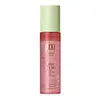What's inside
What's inside
 Key Ingredients
Key Ingredients

 Benefits
Benefits

 Concerns
Concerns

 Ingredients Side-by-side
Ingredients Side-by-side

Water
Skin ConditioningButylene Glycol
HumectantGlycerin
HumectantPropanediol
SolventSorbitol
HumectantCeramide NP
Skin ConditioningCholesterol
EmollientPhytosphingosine
Skin ConditioningLactobacillus Ferment
Skin ConditioningBifida Ferment Filtrate
Skin ConditioningStearic Acid
CleansingCaprylyl Glycol
EmollientOleic Acid
EmollientCaprylic/Capric Triglyceride
MaskingHydrogenated Lecithin
EmulsifyingAllantoin
Skin ConditioningPanthenol
Skin ConditioningLactic Acid
BufferingBetaine
HumectantHydroxyethylcellulose
Emulsion StabilisingHydroxyacetophenone
Antioxidant1,2-Hexanediol
Skin ConditioningCaprylhydroxamic Acid
Water, Butylene Glycol, Glycerin, Propanediol, Sorbitol, Ceramide NP, Cholesterol, Phytosphingosine, Lactobacillus Ferment, Bifida Ferment Filtrate, Stearic Acid, Caprylyl Glycol, Oleic Acid, Caprylic/Capric Triglyceride, Hydrogenated Lecithin, Allantoin, Panthenol, Lactic Acid, Betaine, Hydroxyethylcellulose, Hydroxyacetophenone, 1,2-Hexanediol, Caprylhydroxamic Acid
Water
Skin ConditioningOlea Europaea Fruit Oil
MaskingGlycerin
HumectantDipropylene Glycol
HumectantButylene Glycol
HumectantArgania Spinosa Kernel Oil
EmollientCaprylyl Glycol
Emollient1,2-Hexanediol
Skin ConditioningCarthamus Tinctorius Seed Oil
MaskingBetaine
HumectantPersea Gratissima Oil
Skin ConditioningIllicium Verum Fruit Extract
PerfumingTrehalose
HumectantPanthenol
Skin ConditioningEclipta Prostrata Extract
Skin ConditioningArtemisia Absinthium Extract
Skin ConditioningArnica Montana Flower Extract
MaskingAchillea Millefolium Extract
CleansingViola Mandshurica Flower Extract
AntioxidantHibiscus Esculentus Fruit Extract
Skin ConditioningAloe Barbadensis Leaf Extract
EmollientGentiana Lutea Root Extract
Skin ConditioningPelargonium Graveolens Flower Oil
MaskingCymbopogon Martini Oil
MaskingMelia Azadirachta Leaf Extract
Skin ConditioningVegetable Oil
Skin ConditioningCananga Odorata Flower Oil
MaskingRosa Damascena Flower Oil
MaskingCitrus Aurantium Bergamia Peel Oil
Propylene Glycol
HumectantMoringa Oleifera Seed Oil
EmollientTocopherol
AntioxidantWater, Olea Europaea Fruit Oil, Glycerin, Dipropylene Glycol, Butylene Glycol, Argania Spinosa Kernel Oil, Caprylyl Glycol, 1,2-Hexanediol, Carthamus Tinctorius Seed Oil, Betaine, Persea Gratissima Oil, Illicium Verum Fruit Extract, Trehalose, Panthenol, Eclipta Prostrata Extract, Artemisia Absinthium Extract, Arnica Montana Flower Extract, Achillea Millefolium Extract, Viola Mandshurica Flower Extract, Hibiscus Esculentus Fruit Extract, Aloe Barbadensis Leaf Extract, Gentiana Lutea Root Extract, Pelargonium Graveolens Flower Oil, Cymbopogon Martini Oil, Melia Azadirachta Leaf Extract, Vegetable Oil, Cananga Odorata Flower Oil, Rosa Damascena Flower Oil, Citrus Aurantium Bergamia Peel Oil, Propylene Glycol, Moringa Oleifera Seed Oil, Tocopherol
 Reviews
Reviews

Ingredients Explained
These ingredients are found in both products.
Ingredients higher up in an ingredient list are typically present in a larger amount.
1,2-Hexanediol is a synthetic liquid and another multi-functional powerhouse.
It is a:
- Humectant, drawing moisture into the skin
- Emollient, helping to soften skin
- Solvent, dispersing and stabilizing formulas
- Preservative booster, enhancing the antimicrobial activity of other preservatives
Betaine is a common humectant (a substance that promotes retention of moisture). It's known to be gentle on the skin and can help balance hydration.
This ingredient is best for improving hydration and soothing irritated skin. Studies also show it helps even out skin tone.
Fun fact: Betaine is naturally created in the skin and body. The kind found within cosmetic products can be either plant-derived or synthetic.
Another name for betaine is trimethylglycine.
Learn more about BetaineButylene Glycol (or BG) is used within cosmetic products for a few different reasons:
Overall, Butylene Glycol is a safe and well-rounded ingredient that works well with other ingredients.
Though this ingredient works well with most skin types, some people with sensitive skin may experience a reaction such as allergic rashes, closed comedones, or itchiness.
Learn more about Butylene GlycolCaprylyl Glycol is a humectant and emollient, meaning it attracts and preserves moisture.
It is a common ingredient in many products, especially those designed to hydrate skin. The primary benefits are retaining moisture, skin softening, and promoting a healthy skin barrier.
Though Caprylyl Glycol is an alcohol derived from fatty acids, it is not the kind that can dry out skin.
This ingredient is also used as a preservative to extend the life of products. It has slight antimicrobial properties.
Learn more about Caprylyl GlycolGlycerin is already naturally found in your skin. It helps moisturize and protect your skin.
A study from 2016 found glycerin to be more effective as a humectant than AHAs and hyaluronic acid.
As a humectant, it helps the skin stay hydrated by pulling moisture to your skin. The low molecular weight of glycerin allows it to pull moisture into the deeper layers of your skin.
Hydrated skin improves your skin barrier; Your skin barrier helps protect against irritants and bacteria.
Glycerin has also been found to have antimicrobial and antiviral properties. Due to these properties, glycerin is often used in wound and burn treatments.
In cosmetics, glycerin is usually derived from plants such as soybean or palm. However, it can also be sourced from animals, such as tallow or animal fat.
This ingredient is organic, colorless, odorless, and non-toxic.
Glycerin is the name for this ingredient in American English. British English uses Glycerol/Glycerine.
Learn more about GlycerinPanthenol is a common ingredient that helps hydrate and soothe the skin. It is found naturally in our skin and hair.
There are two forms of panthenol: D and L.
D-panthenol is also known as dexpanthenol. Most cosmetics use dexpanthenol or a mixture of D and L-panthenol.
Panthenol is famous due to its ability to go deeper into the skin's layers. Using this ingredient has numerous pros (and no cons):
Like hyaluronic acid, panthenol is a humectant. Humectants are able to bind and hold large amounts of water to keep skin hydrated.
This ingredient works well for wound healing. It works by increasing tissue in the wound and helps close open wounds.
Once oxidized, panthenol converts to pantothenic acid. Panthothenic acid is found in all living cells.
This ingredient is also referred to as pro-vitamin B5.
Learn more about PanthenolWater. It's the most common cosmetic ingredient of all. You'll usually see it at the top of ingredient lists, meaning that it makes up the largest part of the product.
So why is it so popular? Water most often acts as a solvent - this means that it helps dissolve other ingredients into the formulation.
You'll also recognize water as that liquid we all need to stay alive. If you see this, drink a glass of water. Stay hydrated!
Learn more about Water